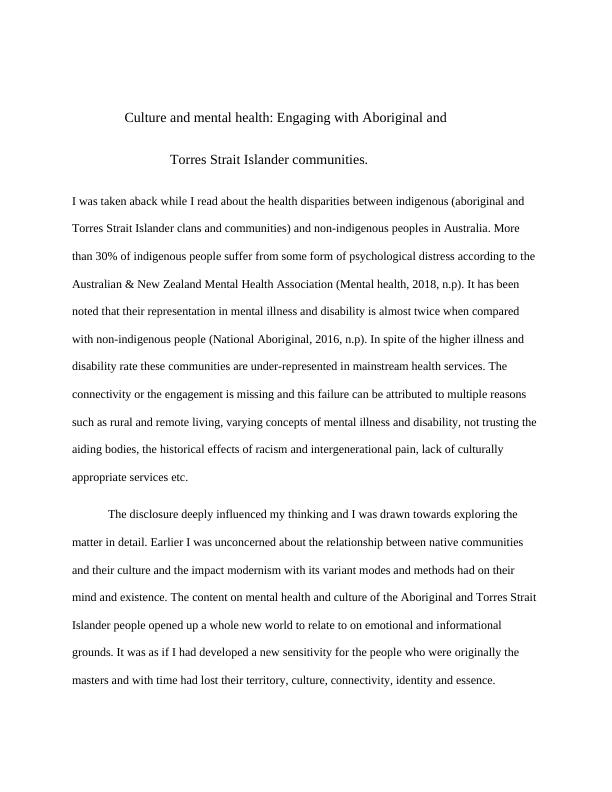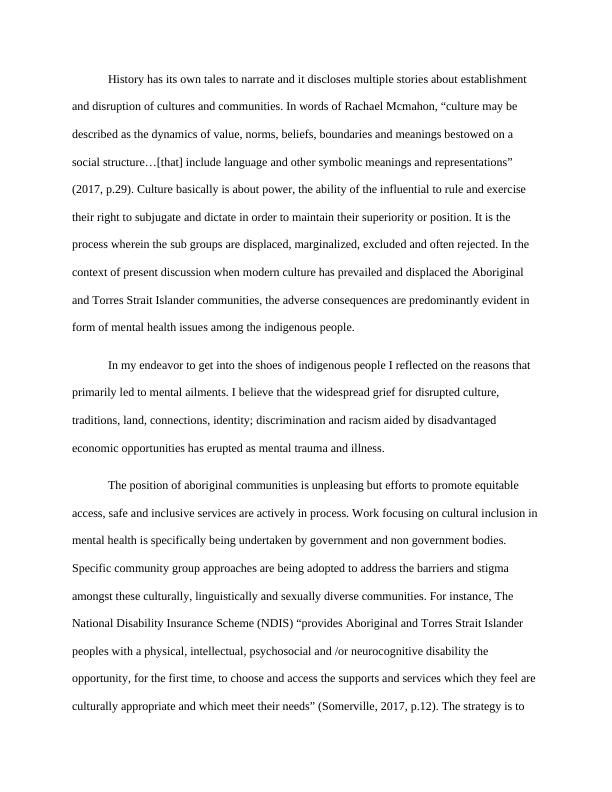Culture and Mental Health: Engaging with Aboriginal and Torres Strait Islander Communities
Added on 2023-04-19
5 Pages1174 Words349 Views
Culture and mental health: Engaging with Aboriginal and
Torres Strait Islander communities.
I was taken aback while I read about the health disparities between indigenous (aboriginal and
Torres Strait Islander clans and communities) and non-indigenous peoples in Australia. More
than 30% of indigenous people suffer from some form of psychological distress according to the
Australian & New Zealand Mental Health Association (Mental health, 2018, n.p). It has been
noted that their representation in mental illness and disability is almost twice when compared
with non-indigenous people (National Aboriginal, 2016, n.p). In spite of the higher illness and
disability rate these communities are under-represented in mainstream health services. The
connectivity or the engagement is missing and this failure can be attributed to multiple reasons
such as rural and remote living, varying concepts of mental illness and disability, not trusting the
aiding bodies, the historical effects of racism and intergenerational pain, lack of culturally
appropriate services etc.
The disclosure deeply influenced my thinking and I was drawn towards exploring the
matter in detail. Earlier I was unconcerned about the relationship between native communities
and their culture and the impact modernism with its variant modes and methods had on their
mind and existence. The content on mental health and culture of the Aboriginal and Torres Strait
Islander people opened up a whole new world to relate to on emotional and informational
grounds. It was as if I had developed a new sensitivity for the people who were originally the
masters and with time had lost their territory, culture, connectivity, identity and essence.
Torres Strait Islander communities.
I was taken aback while I read about the health disparities between indigenous (aboriginal and
Torres Strait Islander clans and communities) and non-indigenous peoples in Australia. More
than 30% of indigenous people suffer from some form of psychological distress according to the
Australian & New Zealand Mental Health Association (Mental health, 2018, n.p). It has been
noted that their representation in mental illness and disability is almost twice when compared
with non-indigenous people (National Aboriginal, 2016, n.p). In spite of the higher illness and
disability rate these communities are under-represented in mainstream health services. The
connectivity or the engagement is missing and this failure can be attributed to multiple reasons
such as rural and remote living, varying concepts of mental illness and disability, not trusting the
aiding bodies, the historical effects of racism and intergenerational pain, lack of culturally
appropriate services etc.
The disclosure deeply influenced my thinking and I was drawn towards exploring the
matter in detail. Earlier I was unconcerned about the relationship between native communities
and their culture and the impact modernism with its variant modes and methods had on their
mind and existence. The content on mental health and culture of the Aboriginal and Torres Strait
Islander people opened up a whole new world to relate to on emotional and informational
grounds. It was as if I had developed a new sensitivity for the people who were originally the
masters and with time had lost their territory, culture, connectivity, identity and essence.

History has its own tales to narrate and it discloses multiple stories about establishment
and disruption of cultures and communities. In words of Rachael Mcmahon, “culture may be
described as the dynamics of value, norms, beliefs, boundaries and meanings bestowed on a
social structure...[that] include language and other symbolic meanings and representations”
(2017, p.29). Culture basically is about power, the ability of the influential to rule and exercise
their right to subjugate and dictate in order to maintain their superiority or position. It is the
process wherein the sub groups are displaced, marginalized, excluded and often rejected. In the
context of present discussion when modern culture has prevailed and displaced the Aboriginal
and Torres Strait Islander communities, the adverse consequences are predominantly evident in
form of mental health issues among the indigenous people.
In my endeavor to get into the shoes of indigenous people I reflected on the reasons that
primarily led to mental ailments. I believe that the widespread grief for disrupted culture,
traditions, land, connections, identity; discrimination and racism aided by disadvantaged
economic opportunities has erupted as mental trauma and illness.
The position of aboriginal communities is unpleasing but efforts to promote equitable
access, safe and inclusive services are actively in process. Work focusing on cultural inclusion in
mental health is specifically being undertaken by government and non government bodies.
Specific community group approaches are being adopted to address the barriers and stigma
amongst these culturally, linguistically and sexually diverse communities. For instance, The
National Disability Insurance Scheme (NDIS) “provides Aboriginal and Torres Strait Islander
peoples with a physical, intellectual, psychosocial and /or neurocognitive disability the
opportunity, for the first time, to choose and access the supports and services which they feel are
culturally appropriate and which meet their needs” (Somerville, 2017, p.12). The strategy is to
and disruption of cultures and communities. In words of Rachael Mcmahon, “culture may be
described as the dynamics of value, norms, beliefs, boundaries and meanings bestowed on a
social structure...[that] include language and other symbolic meanings and representations”
(2017, p.29). Culture basically is about power, the ability of the influential to rule and exercise
their right to subjugate and dictate in order to maintain their superiority or position. It is the
process wherein the sub groups are displaced, marginalized, excluded and often rejected. In the
context of present discussion when modern culture has prevailed and displaced the Aboriginal
and Torres Strait Islander communities, the adverse consequences are predominantly evident in
form of mental health issues among the indigenous people.
In my endeavor to get into the shoes of indigenous people I reflected on the reasons that
primarily led to mental ailments. I believe that the widespread grief for disrupted culture,
traditions, land, connections, identity; discrimination and racism aided by disadvantaged
economic opportunities has erupted as mental trauma and illness.
The position of aboriginal communities is unpleasing but efforts to promote equitable
access, safe and inclusive services are actively in process. Work focusing on cultural inclusion in
mental health is specifically being undertaken by government and non government bodies.
Specific community group approaches are being adopted to address the barriers and stigma
amongst these culturally, linguistically and sexually diverse communities. For instance, The
National Disability Insurance Scheme (NDIS) “provides Aboriginal and Torres Strait Islander
peoples with a physical, intellectual, psychosocial and /or neurocognitive disability the
opportunity, for the first time, to choose and access the supports and services which they feel are
culturally appropriate and which meet their needs” (Somerville, 2017, p.12). The strategy is to

End of preview
Want to access all the pages? Upload your documents or become a member.
Related Documents
Introduction to Indigenous Australianslg...
|7
|2036
|18
The Role of Culture in Shaping Health Beliefs: A Reflective Assignmentlg...
|6
|1311
|197
NURBN2008 - Affiliation Health and Cultural Diversitylg...
|5
|1112
|55
Native Australians Had a Significantly Greater Burden of Illnesslg...
|3
|1736
|13
Aboriginal and Torres Islander Healthlg...
|9
|2135
|74
Socially inclusive nursing roles in Aboriginal Community Controlled Health Serviceslg...
|7
|2118
|80
